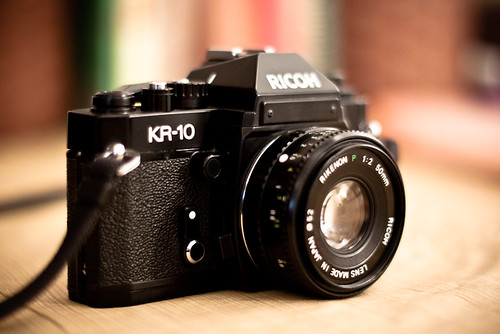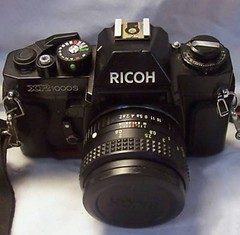Difference between revisions of "Ricoh KR-10"
(Thanks to Just Plain Curt have nailed down diffs. of SE variant) |
m (bolding model name) |
||
| Line 8: | Line 8: | ||
|image_rights= wp | |image_rights= wp | ||
}} | }} | ||
| − | The KR-10 is an [[SLR]] for [[35mm film]] made by [[Ricoh]], beginning in 1980. In some markets it was designated '''Ricoh XR 1000 S'''. The '''KR-10SE''' is a minor variant, in silver and omitting the self-timer. (Note that the [[Ricoh KR-10M|KR-10M]] and [[Ricoh KR-10S|KR-10 Super]] are different models.) | + | The '''KR-10''' is an [[SLR]] for [[35mm film]] made by [[Ricoh]], beginning in 1980. In some markets it was designated '''Ricoh XR 1000 S'''. The '''KR-10SE''' is a minor variant, in silver and omitting the self-timer. (Note that the [[Ricoh KR-10M|KR-10M]] and [[Ricoh KR-10S|KR-10 Super]] are different models.) |
Like its predecessor the [[Ricoh XR-2]], the KR-10 offers [[aperture-priority]] autoexposure; but this is a simpler model, omitting the multiple-exposure control or the aperture-ring sighting window in the viewfinder. | Like its predecessor the [[Ricoh XR-2]], the KR-10 offers [[aperture-priority]] autoexposure; but this is a simpler model, omitting the multiple-exposure control or the aperture-ring sighting window in the viewfinder. | ||
Revision as of 01:11, 4 October 2011

|
| image by Mediumjones (Image rights) |
The KR-10 is an SLR for 35mm film made by Ricoh, beginning in 1980. In some markets it was designated Ricoh XR 1000 S. The KR-10SE is a minor variant, in silver and omitting the self-timer. (Note that the KR-10M and KR-10 Super are different models.)
Like its predecessor the Ricoh XR-2, the KR-10 offers aperture-priority autoexposure; but this is a simpler model, omitting the multiple-exposure control or the aperture-ring sighting window in the viewfinder.
To unlock the shutter, the film wind lever must be pulled outwards. The electronically-timed Copal shutter provides a wide range of speeds from 1/1000 second to 4 seconds plus B, with flash sync up to 1/125 sec. (In autoexposure mode, the shutter can stay open for up to 8 seconds). The shutter is dependent on power from two 1.5v LR44/SR44 batteries, without which only the mechanical speeds of "X" (1/90th second) and B may be used. A half-press on the shutter release is needed to activate the exposure indicator needle in the viewfinder.
Links
- Ricoh KR-10 manual from Mike Butkus' OrphanCameras.com
In Japanese

|
| As Ricoh XR 1000 S image by Michael Brannon (Image rights) |

|
| Ricoh KR-10SE variant image by Just Plain Curt (Image rights) |